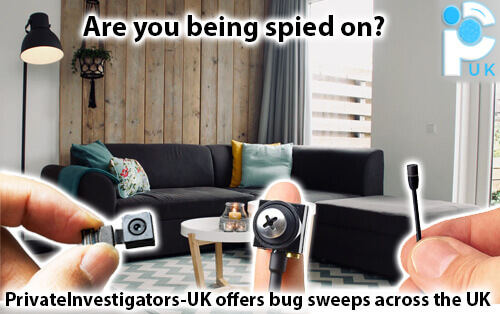Are Hidden Listening Devices Legal in the UK?
April 2, 2024 - Reading time: 10 minutes
Updated on: October 7, 2025
The use of listening devices, or 'bugs', in the UK is subject to various legal stipulations. Owning audio or visual recording tools is not illegal in itself, but whether their use is lawful depends on how and where they are used. This guide explains the rules, what hidden microphones look like, and how to detect and remove bugs if you think there is a device in your home, office, or vehicle.

Quick Navigation
Hidden Listening Devices
A device is categorised as covert when its microphone is not readily visible. Many are deliberately small and unmarked, which makes them hard to locate without specialist equipment. Spy gear sites sell a wide range of bugs, from simple recorders to well-camouflaged devices disguised as pens, clocks, power outlets, USB chargers, calculators, wrist watches, or even toothbrushes.
Are Listening Devices Legal in the UK?
Recording in public spaces is generally permissible. In private settings the rules are stricter. Owners or lawful occupants may install recording devices on their own premises or in their own vehicles. Landlords cannot install devices inside tenanted properties as that would likely amount to harassment. Placing a bug in someone else’s home, office, or car without permission is generally unlawful. Law enforcement and intelligence bodies may deploy devices only with proper authorisation.
You may record conversations that you are part of, but misuse of the recording can still lead to criminal or civil action, for example harassment or defamation.
What Do Hidden Microphones Look Like?
Most covert microphones are small, plain pieces of black plastic containing a microphone capsule, a battery, and a simple Wi-Fi or GSM module. On their own they might appear as a bare circuit board or a tiny unbranded box. More commonly they are concealed inside everyday electronics so nothing looks out of place. Typical hiding spots include:
- Plug sockets, extension leads, multi-adaptors
- Alarm clocks, smoke or CO detectors, sound bars
- USB chargers, power banks, desktop speakers
- Car dashboards, seat panels, boot linings
Because the device is embedded inside a working product, you often need to open or disassemble the item to notice the microphone or additional board. Low-cost bugs bought online may run for only a few hours. Better-made devices can record or transmit for days and some upload audio straight to the cloud.
Are Hidden Microphones Hard to Find?
Yes. Many covert listening devices are difficult to detect without professional bug sweep equipment that costs thousands of pounds. Effective Technical Surveillance Counter Measures rely on spectrum analysers, near-field probes, GSM locators, lens detectors, thermal imaging, Wi-Fi sweeps, and most importantly the experience to interpret signals and physically locate a device.
Cheap handheld “bug detectors” found online can be useful for a quick check, but they often miss modern devices or generate false positives. If you want to be certain your property is clear, instruct a professional TSCM sweep.
Eavesdropping Tools
The term bug became shorthand for an eavesdropping device in the mid-20th century. A basic bug combines a microphone, power source, and a transmitter. Modern versions may also include miniature cameras, Wi-Fi modules, and cloud upload so recordings can be accessed remotely in near real time.
GSM Based Equipment
Some devices use a SIM card and the mobile network. The user can dial the device to listen live or control it via an app. Internet-connected bugs may back up to the cloud automatically. Even if you destroy the physical device, the recordings may already be stored remotely.
Elimination of Eavesdropping Equipment
The market is full of listening devices and so-called detectors. Some are credible, many are not. Generally, the more sophisticated a bug is, the more advanced the detection tools need to be. Professional sweeps use a toolkit such as near-field receivers, non-linear junction detectors, spectrum analysers, GSM locators, lens finders, forensic light sources, and thermal imaging, paired with a thorough physical search.
Worried about hidden bugs? Get peace of mind 🕵️♂️
Professional Bug Sweep (TSCM) Services – UK Nationwide
- We can locate and remove covert microphones, cameras, GPS trackers and Wi-Fi devices.
- Advanced RF scanning, lens detection and meticulous physical inspection.
- Free & confidential estimates: just send us your postcode and property size.
Data Protection Considerations
Recording for personal reasons inside your own home is generally acceptable. For example, using a device in your lounge to evidence infidelity is not unlawful in itself. Commercial use is different. If you plan to use recordings for business or marketing you will usually need informed consent from the people recorded.
See the UK GDPR guidance from the Information Commissioner’s Office.
Related articles
You are reading the PrivateInvestigators-UK blog — home to the UK's leading detective agency. Learn more about us by visiting our homepage PrivateInvestigators-UK.com.
